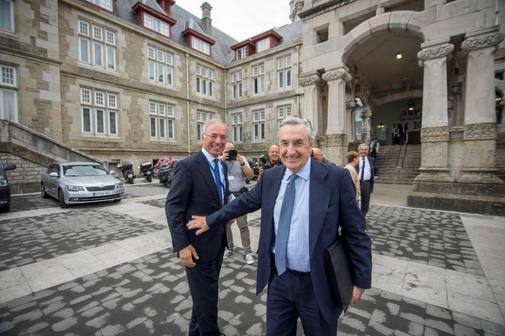José María Marín Quemada celebrates six years at the helm of the National Commission of Markets and Competition (CNMC). "The one who wrote the law came up with the brilliant idea that this mandate was non-extendable, which I share, because I believe that six years must be enough, but that we had to stay until the substitute came," he said before summer on the subject of its renewal.
As of today, he will continue in office with the expired mandate, as well as four other members of the regulator's leadership: the advisors Josep Maria Guinart, Clotilde de la Higuera and Benigno Valdés, in addition to the vice president, María Fernández. In this scenario, the organization that presides over Marín Quemada will make decisions to change forever two sectors as relevant as energy and audiovisual .
Last June, Marín Quemada was confident that "things will work quickly" to facilitate his relief, something that has neither happened nor will happen soon. Upon return from vacation and even without a Government, there is no consolidated Ministry of Economy that can present a candidate to Parliament for the relief to materialize. Of course, the delay will help the president of the superregulator, who took office in 2013 when the PP ruled the country, can lead two of the main measures that Spain has attended in terms of competition: the fall in the price of energy and a millionaire fine that hangs over the two operators that mark the television market: Mediaset and Atresmedia.
In this discount period, companies in these sectors are waiting for the weight of competition to fall on their businesses and irreparably alter their balance. The intention of the CNMC is to launch its verdict before the end of the year, and Marín Quemada hopes to lead the measures at the head of the organization, as a culmination for his professional career.
Cheaper energy
One of the specialties of Quemada himself, a training economist, is the energy field. The regulator advocates a reduction of the same through cuts of up to 18% to pay the distribution of gas and up to 7% in the case of electricity. In the Energy Forum held on Thursday, Marín Quemada defended his position in the face of the main executives of the sector and with "legal and regulatory stability" as an argument for this decrease in costs that "will have an impact on consumers."
In the sector, legal measures are proposed such as those announced by Naturgy in the mouth of the president of that gas, Francisco Reynés. The CNMC advocates a "lowering of the price of electricity for the benefit of consumers" which can lead to a reduction in energy costs of about 6,000 million, only between 2020 and 2025 . Companies like Naturgy have already announced a brake on their investments in this new scenario.
Marín Quemada, on television
The audiovisual business also depends on the criteria of Marín Quemada, and not for the electricity that powers the televisions. The supervisor opened a file in February 2018 that has Mediaset and Atresmedia in suspense, the two large audiovisual groups that control, respectively, Telecinco and Cuatro, as well as Antena 3 and La Sexta.
The CNMC investigates whether the advertising business of these two operators deactivates the commercial possibilities of the rest of the chains. The file for "possible restrictive practices of competition" in advertising sales can result in fines of up to 10% of the annual turnover of each company, and therefore reach 100 million euros per operator. The sanction, of enormous proportions, is not the biggest concern for operators, but a change of model, as recognized by sources in the sector to this newspaper.
If the gas sector is unhappy, even more so the audiovisual, until charging against Marín Quemada. Paolo Vasile, CEO of Mediaset Spain, has criticized " the animosity repeatedly shown publicly by the president of the CNMC " while awaiting "a resolution that seems already decided ahead of time." Different television sources attribute to Marín Quemada a certain alignment with Carmen Martínez de Castro, former Secretary of State for Communication, who in the last stage of the PP Government did not find the expected support in Mediaset and Atresmedia, the latter owner of La Sixth.
Whether or not there is a duopoly, in practice Mediaset accounted for 43.3% of advertising investment last year, for 40.5% of Atresmedia; that is, only those two companies controlled 83.5% of the total figure, as evidenced by the Infoadex consensus calculations.
At the worst time for the chains?
The historic fine would occur precisely when the income of these two groups seems to have reached a ceiling and they begin to resent. The moment of conversion is delicate for Mediaset and Atresmedia, which are readjusting to the era of Netflix, HBO, Amazon Prime Video and the rest of streaming services that will soon be added, among others, Disney and Apple. Mediaset's net advertising revenue on television has dropped 5% in the first half of 2019, while those of Atresmedia have dropped 6%. Neither group experienced declines in their turnover since the economic crisis began .
In addition, Mediaset has just approved its merger by absorption to reconfigure the company in Europe, with the opposition of the French shareholder Vivendi. The pending decision of the CNMC does not help to improve the valuation of a company that last year saw 41.34% of its stock price vanish.
According to the criteria of The Trust Project
Know more- Mediaset
- Atresmedia
- Naturgy
- The sixth
- PP
- Spain
- Telecinco
- Netflix
- HBO
- Disney
- Antenna 3
- economy
The next economy Dear brands, greenwashing no longer leaks
Murcia The pilot of the Army plane that fell into the water in front of La Manga del Mar Menor dies
Economy Trade war, Italy and Brexit, the other major threats that ballast Spanish companies

